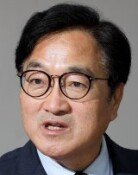More Foreign CEOs for Korean Companies
More Foreign CEOs for Korean Companies
Posted November. 25, 2006 08:10,
Renault Samsung Motors CEO Jean-Marie Hurtiger recently dined with the directors at a renowned restaurant in Insa-dong, Seoul. They ate steak with wine.
Since Renault took over the company in 2000, company dinners have been held at western restaurants most of the time. Some of the directors even studied wines to recommend good ones to the CEO.
One director at S-oil was refused after asking Saudi Arabian CEO Samir A. Tubayyeb for a lunchtime coffee early last month. This director only thought that Tubayyeb was not feeling well. However, he realized his mistake after hearing that Muslims do not eat anything until sunset during Ramadan, a fasting period. He asked his CEO for a coffee during the Ramadan period.
Enterprise culture modified by foreign CEOs-
There is a change in Korean enterprise culture as the number of foreign CEOs increases. Furthermore, as foreign CEOs are more varied in terms of diversity, from U.S.A. and Europe to Middle Asia and China, enterprise culture is becoming multinational.
The Korea Chamber of Commerce & Industry (KCCI), after analyzing the top 100 enterprises in sales for 2005, announced that 13 enterprises had foreign CEOs compared to 6 firms in 2002. This is a 216 percent increase in three years. KCCI anticipated the number of firms with foreign CEO to increase to 30 for 2015.
LG Economic Research Institutes researcher Yoon Eon-chul said, As the number of firms owned by foreigners, and the number of foreign elite managers in domestic firms increases, more foreign managers are expected in the future.
Those enterprises that are managed by foreigners have rapidly moved on from vertical order and obedience relationships to horizontal, team-oriented organizations. Decreased emphasis on personal relationships and lobbying, and more on business systems, is the current trend.
GM Daewoo Auto & Technologys Kim Jong-do, a senior vice president, noted, As foreign CEOs communicate through e-mail with every worker, fast decision-making and practical goal setting is possible.
SC First Bank has recently implemented a rule to leave the office on time every Wednesday to promote worker health and happiness. Workers must go home even if they have work left.
The dining culture of going to second and third places is gradually disappearing. Foreign drinking culture of going to wine bars and conversing with others is replacing the former.
Of course there are a lot of foreign CEOs who try to adapt to Korean culture as well.
CEO Hurtiger studies Korean two hours per week and learned how to drink poktanju. He visited Panmunjeom to experience the Korean peninsulas pain of division. Last month, he even offered a sacrifice for smooth production wearing a Korean traditional hat and overcoat in a Busan factory.
More foreigners work for Korean firms-
With more foreigner CEOs, more foreign elites have penetrated Korean enterprises.
Jobkorea, an online recruiting firm, after analyzing 217 domestic firms with more than 100 workers found that 27.2 percent employed foreigners this year.
58.5 percent of large enterprises employed foreigners. Koreans planning on employment have to compete with foreigners and interview with foreign CEOs.
Foreigners are being hired not just as normal workers, but also as directors.
LG Electronics is expected to have their first foreign director next year. About 50 foreign executives from 77 overseas corporations were nominated as candidates for director.
LG Electronic Kim Young-gi, human resources director, argued, As firms become more globalized, foreign directors roles will increase. Foreign elites will contribute a lot to increases in the competitiveness and success of firms.
A lot of effort-
Foreign company As directors are suffering from Wednesday syndrome. Every Wednesday, a meeting organized by the foreign CEO in English runs for over 5 hours.
As only English is used in meetings where the CEO attends, those directors not comfortable with the language say that the meeting is like a nightmare.
One director confessed, Most directors go to academies early in the morning and have private English tutors. On weekends, instead of golfing, we write down presentation content in Korean and ask friends for help in translating and memorizing them. We put into a lot of effort, but it is not easy to be familiar with English conversation.
There also is criticism that as foreigners, they do not care much about Koreas national interests.
A director who has a foreign boss said, There are many things that we can learn from foreign CEOs as they work reasonably and quickly. He added, It is a sad thing that in situations where Korean and the companys interest collide, they tend to not give consideration to Korean interests.
Therefore, when dealing with sensitive questions such as nationality and ideology, great caution is required.
Not mentioning Americas dominance and the Iraq crisis in front of American CEOs, and Chinas program on Northeast Asia to Chinese CEOs, is common sense.






